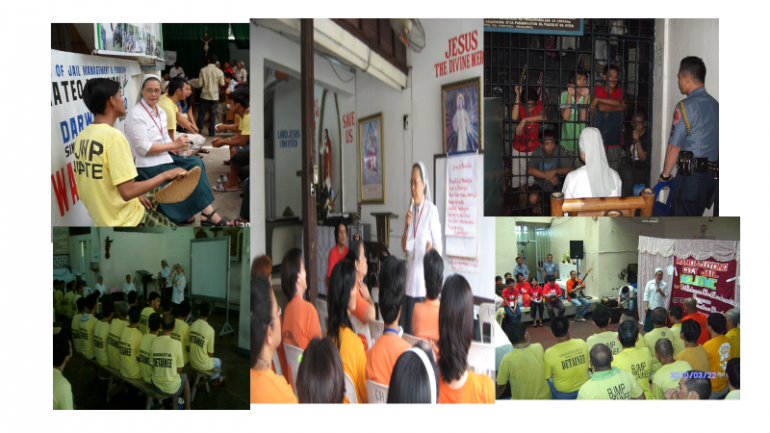Filipina nun crusades to build prisoners’ lives back better

A Filipina nun who works in prison ministry says the church is committed to rebuilding lives, rekindling hope, and restoring dignity.
The goal of the prison ministry is to restore people's rights and dignity as God's creations and help them get back into society with their families, said Sister Zenaida Cabrera, the coordinator of the Caritas program of assistance to the detainees.
The pastoral ministry in prisons should be seen from the point of view that everything alive is God's creation, Cabrera, a member of the Congregation of the Servants of the Holy Eucharist (SHE), told RVA News on October 12.
The origins of SHE may be traced back to a cell group created following a parish renewal experience (PREX) at Immaculate Conception Parish, Pasig, near Manila, Philippines.
"Every prisoner who despises his situation has hope from God that she or he will not be forgotten as God's child," she said.
The Catholic nun has been involved in the prison ministry since she made the first vows in her congregation in 1997.
She remembered that the prison ministry started when the community she had just begun in Pasig, Quezon, Philippines, moved to Tondo, Manila.
She said, "It was a blessing that Cardinal Jaime Sin, then Archbishop of Manila, provided us with a nicer place to dwell."
Her congregation's involvement in the jail ministry began when they got in touch with Caritas Manila in Tondo, which urged them to make the jail apostolate their main charism (the focus of pastoral ministry).
Caritas Manila is the social action wing of the Archdiocese of Manila.
"Caritas Manila was looking for a group that could frequently visit the prisoners. We had just moved in, and Caritas asked if we might include the mission as part of our apostolate involvement in the Manila City jails," she recalled.
She has been active in prison ministry for over 25 years. She has worked with other SHE members and volunteers in several jails, including Fairview, Amparo, Kongreso, and Muntinlupa City.
The nun made it clear that the mission in prison is more than just putting on programs and doing a lot of work.
"Those who don't believe that inmates' lives are just as important as everyone else's can't do prison ministry for a long time," she said.
According to her, being a part of the prison ministry requires involvement in the lives of others.
"This is my conviction: Being involved in prison ministry implies acting in the ministry in people's lives with compassion," she added.

The congregation's prison ministry's initiatives are known as the "3 Rs"—restore, rehabilitate, and reintegrate.
The first one is anchored in the Restorative Justice Ministry—which she considers the most holistic approach to incarcerated convicts.
Caritas RJ, or Restorative Justice Ministry, was added to the primary goal of her congregation.
The program's "restoration" phase aims to teach prisoners about human rights and their importance as children of God.
"We want to teach them about what it means to be a person and how to forgive and how to renew their lives for the better with the help of others," she said.
The members of the congregation are committed to building a disciplined community among the prisoners and their families so that there can be better reintegration.
"It helps convicts feel the transformative presence of Christ, no matter their pasts, religious beliefs, or cultural backgrounds," said Cabrera.
The nun emphasized that this vision was mirrored in the goal of restorative justice volunteers: to pave the path for the reintegration of both victims and criminals and enhance family ties.
"During the rehabilitation phase, prisoners participate in religious activities and meet with counselors to help them grow spiritually. This helps shape and develop their spirituality, behavior, and skills," she said.
According to her, reintegration is achieved through paralegal assistance and family life education.
However, the nun noted that it was difficult to gain support from individuals, such as the families of the convicts, at least in some cases.
"We have occasionally encountered families that do not want any further family members to return home," she said. "To restore justice in their lives, we must first establish trust and focus on optimism."
The nun stated, "Every prisoner who despises his or her circumstances has faith in God that they will not be forgotten as God's children."

As she and other congregation members have maintained ministry in prison, she campaigns for prisoners' freedom because they are God's children who need to be loved, cared for, and guided.
"I hope the prisoners will be able to return to themselves." They recognize that they are human, a reflection of God, who loves everyone."
They have more opportunities to reinvent their selves—a better version of their lives—better than their past lives.
"We highly cherish the dignity of every individual. Even if I am familiar with the lives of criminals who have committed wrongdoing," she added, "I believe in God's love, which can transform their lives."
"A person cannot engage in this ministry if one is not in love with love or inspired by God," she added.
She believes every prisoner can always attain independence for their good and better future.
She and her members consistently conveyed to prisoners that they were not from behind a wall and, at the very least, were aware that they were all God's children.
"This is the starting point of their hope, change, and grace," she added.
Since 1975, the Catholic Bishops' Conference of the Philippines has coordinated prison ministry in the country through Prison Pastoral Care.
As a socio-pastoral apostolate of the Philippine church, many Catholic churches, diocesan teams, and religious congregations, including the Philippine Jesuit Prison Service Foundation Inc. (PJPS), provide holistic rehabilitation services to prisoners.
On October 30, the Philippines will commemorate the 35th Prison Awareness Week under the theme "Towards a listening, healing, loving, and correctional community."
At the end of June 30, the total number of detainees and sentenced individuals in Philippine prisons stood at around 131.2 thousand.
According to Statista, the majority of these inmates were housed in jails in the National Capital Region. There were 470 jails in the country at the time.
Radio Veritas Asia (RVA), a media platform of the Catholic Church, aims to share Christ. RVA started in 1969 as a continental Catholic radio station to serve Asian countries in their respective local language, thus earning the tag “the Voice of Asian Christianity.” Responding to the emerging context, RVA embraced media platforms to connect with the global Asian audience via its 21 language websites and various social media platforms.














